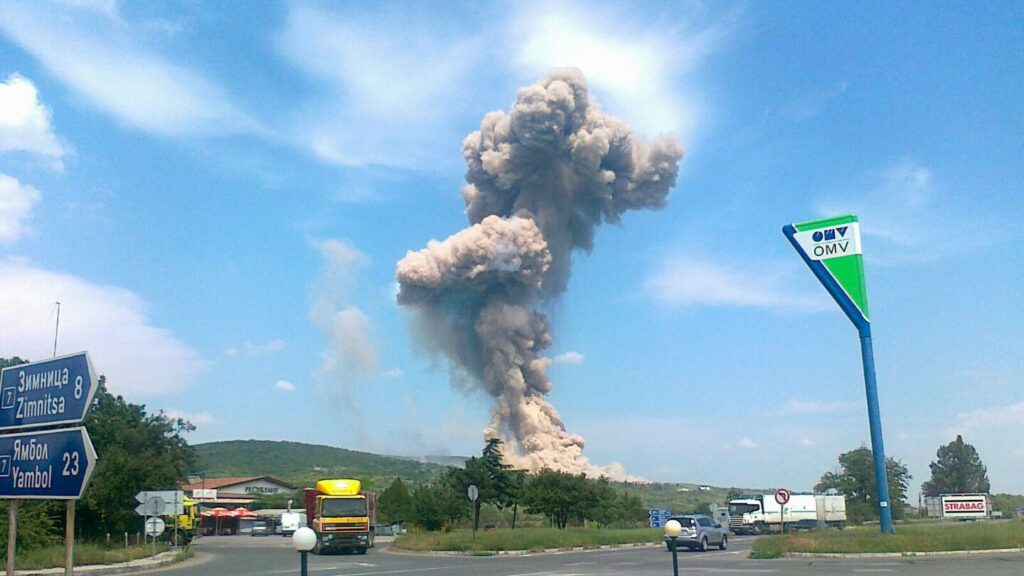BERLIN — Bulgarian prosecutors said Wednesday that they are looking at whether four explosions at weapons depots over the past decade are part of a Russian effort to disrupt the flow of arms from Eastern Europe to battlefields in Ukraine and Georgia.
The investigations into the explosions, which took place between 2011 and 2020, are part of wider probes in Europe linked to suspected Russian military intelligence agents.
Bulgaria’s announcement followed claims by Czech authorities last week that they suspect two agents from Unit 29155 in Russia’s GRU intelligence agency were linked to blasts at an arms warehouse in the Czech Republic in 2014.
The agents they named were the same suspects as those British authorities linked to the 2018 poisoning of former double agent Sergei Skripal and his daughter in 2018 in Salisbury, Britain.
Both Czech and Bulgarian authorities have linked consignments of arms in the targeted warehouses to the Bulgarian arms dealer Emilian Gebrev, who survived a 2015 poisoning in which Bulgaria had initially charged three Russian agents. Two other Bulgarians, including Gebrev’s son, were sickened.
The apparent focus of Russian agents on Gebrev have focused scrutiny on the activities of the arms dealer, who has denied that he was dealing weapons in any meaningful way to Ukraine and has said he does not know why he was targeted.
But prosecutors pointed to his arms deals at a time when Russia had interests in preventing weapons flowing to its adversaries in Europe. At the time Gebrev was poisoned, Russia was in the thick of its war with Ukraine.
“From the evidence thus gathered so far, it can be concluded with a high degree of reliability that the purpose of the actions of the Russian citizens was to cut off the supply of special products to Georgia and Ukraine,” the Bulgarian prosecutor said in a statement.
In Ukraine, government forces have been battling pro-Moscow separatists since 2014, after Russia’s annexation of Crimea. In Georgia, the breakaway region of South Ossetia is backed by Russia.
The head of the Russian State Duma foreign affairs committee, Leonid Slutsky, denied any Russian role in the explosions of Bulgarian weapons depots or production facilities.
“Again unsubstantiated, again based on speculation and again without real evidence,” Slutsky said.
The first suspicious explosion in Bulgaria took place at a warehouse in the village of Lovnidol in 2011, according to prosecutors, who said the warehouse belonged to Gebrev’s arms company, EMCO.
“A significant amount of ammunition and explosives destined for export to the Georgian Ministry of Defense was destroyed,” prosecutors said.
EMCO said that the warehouse did belong to its company but that it was a “blatant lie” that the weapons were bound for Georgia. EMCO said prosecutors dropped their investigation into that explosion in 2013.
Prosecutors said that two more explosions followed in 2015 at warehouses belonging to state-owned arms producer VMZ Sopot. It said some of the arms destroyed in the first 2015 blast belonged to EMCO. The company called that an “outright lie.”
Another blast took place in 2020 at a “strategic site of importance for our national security,” the prosecutor said.
In interviews, Gebrev has said that he sold only small amounts of arms to Ukraine.
Bulgarian authorities had initially charged three Russian agents in absentia in connection with the poisoning, before suspending its probe last year over Gebrev’s protestations. In a statement, EMCO questioned why it had taken Bulgarian authorities so long to act.
But emerging details of the movements of suspected GRU agents have made their activities hard to ignore, even in countries where Moscow wields significant political clout.
A Bellingcat investigation had put Russian agents in Bulgaria around the time of Gebrev’s poisoning and explosions at several weapons depots.
And Russia’s clandestine activities in Bulgaria have come under increasing scrutiny since Czech authorities linked two 2014 blasts there to Russian agents, an accusation that set off tit-for-tat diplomatic expulsions in recent days.
Gebrev’s company has confirmed that its arms were destroyed in an explosion there that Czech authorities blamed on Aleksander Mishkin and Anatoly Chepiga, who were also named in the Salisbury poisoning. It has denied that the arms were about to be exported.
On April 17, Prague announced that 18 diplomats would be expelled over the scandal, and Moscow retaliated by expelling 20. Saying the retaliation was stronger than expected, Prague then announced that it would expel dozens more Russian diplomats to bring the staffing at both embassies in line.
Estonia, Latvia, Lithuania and Romania have all expelled diplomats in an expression of solidarity with Prague, with Russia announcing more expulsions in return.
This month, Sofia also announced that it had broken up a Russian spy ring.
Former Russian president Dmitry Medvedev, deputy head of the Russian Security Council, said the U.S.-allied Czech Republic had ignited a “diplomatic expulsions race” with Russia. He dismissed the Czech allegations of GRU links to the ammunition depot blasts.
“They went ahead and expelled a lot of our diplomats. What did they expect from us? That we’d just take it? I’m not even talking about the pretext, which is made up out of thin air,” he said.
In response to the latest accusations, Russian Foreign Minister Sergei Lavrov called on the European Union to investigate whether private individuals were storing and trading in arms.
Dixon reported from Moscow. Rossen Bossev in Sofia, Bulgaria, contributed to his report.
Opinion: Putin’s Russia isn’t a model for anyone
How Russia’s military intelligence unit became Putin’s tool in battles with the West
Russian troops begin pullback from near Ukraine but message to West lingers
Source link : https://www.washingtonpost.com/world/europe/bulgaria-russia-arms-explosions-czech-republic/2021/04/28/ba2e7004-a812-11eb-a8a7-5f45ddcdf364_story.html
Author :
Publish date : 2021-04-28 03:00:00
Copyright for syndicated content belongs to the linked Source.
